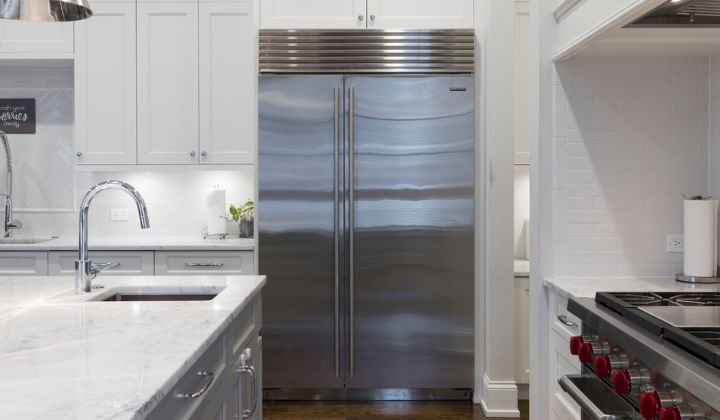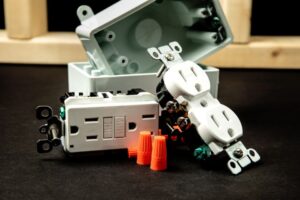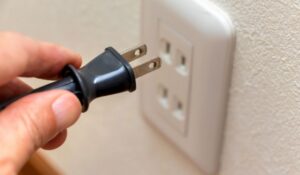When it comes to setting up your kitchen appliances, one of the most important considerations is ensuring they are connected to the right electrical outlets. Unfortunately, it’s not always clear what the best practices are when it comes to refrigerators and electrical outlets.
This is further complicated by nuances in a kitchen’s floor plan, because you want your kitchen to be attractive as well as functional. To keep your business or home’s electrical systems safe, we’ll cover some best practices for refrigerators and electrical outlets in this guide.
Ensure that your refrigerator’s power requirements match the outlet’s amp rating, and consider using a dedicated outlet to prevent overloading. Additionally, position the outlet at a convenient height for easy access, and if uncertain, consult a professional electrician for guidance on optimal setup.
Being a cornerstone of any modern kitchen, we want to help you ensure that your refrigerator works for many years to come, while avoiding safety issues that may arise:
Why Does the Right Refrigerator Electrical Outlet Matter?
The refrigerator is more than just a place to keep your food fresh; it’s a complex appliance that requires a steady and reliable power source. While it might be tempting to think that any available outlet will suffice, there are important factors to consider in choosing the appropriate outlet type for the job:
- Electrical Load: Refrigerators are among the appliances that draw a significant amount of power. Plugging your refrigerator into an outlet that is already overloaded with other devices can lead to electrical issues, circuit overloads, and even safety hazards.
- Start-Up Surge: When a refrigerator’s compressor kicks in, it requires an extra surge of power to get started. If the outlet isn’t equipped to handle this surge, it can strain the electrical system and potentially lead to frequent breaker tripping.
- Appliance Longevity: Providing your refrigerator with a dedicated, appropriate outlet can contribute to its longevity. Inadequate or fluctuating power can cause unnecessary wear and tear on the appliance’s components.
Selecting the Right Outlet: What to Consider
When it comes to choosing the ideal outlet for your refrigerator, keep the following factors in mind:
- Amp Rating: Check the amp rating of both the refrigerator and the outlet. If the voltage is 120, the amperage of the outlet should be somewhere around 3-5. The outlet’s amp rating should match or exceed the refrigerator’s requirements to ensure proper power supply.
- Dedicated Circuit: If possible, dedicate an outlet or circuit solely to the refrigerator. This minimizes the risk of overloading and ensures consistent performance.
- Location and Height: Because refrigerators are often located between a wall and some cabinets, it’s recommended that the height of the outlet be at least a few feet off the floor for easy access.
Frequently asked questions about refrigerator electrical outlets
Some of the most common questions about refrigerators and outles are:
Can a refrigerator be plugged into a regular outlet?
One of the most frequently asked questions is whether it’s safe to plug a refrigerator into a regular three-prong household outlet. The answer depends on the specific requirements of your refrigerator and the electrical circuit it’s connected to.
Most standard refrigerators can indeed be plugged into regular outlets, provided that the outlet is grounded and can handle the electrical load.
Does a Refrigerator Need a Special Outlet?
While many refrigerators can operate on regular outlets, there are instances where a special outlet might be recommended. Larger or more advanced refrigerators (such as commercial units, or those with additional features like ice makers or water dispensers) might have higher power requirements.
In such cases, manufacturers may recommend using a dedicated circuit with a higher amp rating to ensure safe and uninterrupted operation. If you’re unsure, an electrician can answer these questions for you fairly quickly.
Can a Refrigerator Share an Outlet?
While sharing an outlet with a refrigerator might seem convenient, it’s generally not recommended.
Refrigerators can be power-hungry appliances, and sharing an outlet with another device can lead to overloading the circuit. Additionally, the start-up surge of power that refrigerators experience when their compressors kick in could affect the performance of other devices connected to the same outlet.
To ensure optimal functionality and avoid potential electrical problems, it’s best to provide your refrigerator with a dedicated outlet.
Refrigerator Outlet Height
As mentioned above, another important aspect to consider when setting up your refrigerator is the outlet height. Though there is no industry standard height or mandated building codes governing outlet height for refrigerators, the location of the outlet on the wall can impact how easily you can plug in and unplug the refrigerator. Typically, 24 inches to 48 inches off the ground tends to be what most electricians will do.
Ideally, the outlet should be positioned at a height that allows you to access it comfortably. This prevents unnecessary bending or stretching when you need to connect or disconnect the refrigerator.
Consulting with Professionals
If you’re unsure about the electrical requirements or the appropriate outlet for your refrigerator, don’t hesitate to seek guidance from a professional electrician. They can assess your kitchen’s electrical setup, recommend the right outlet, and ensure that the installation adheres to safety standards.
If you’re anywhere in the St. Simons, GA area, give us a call. We would be happy to assist you in your setup, or answer any questions you may have!









